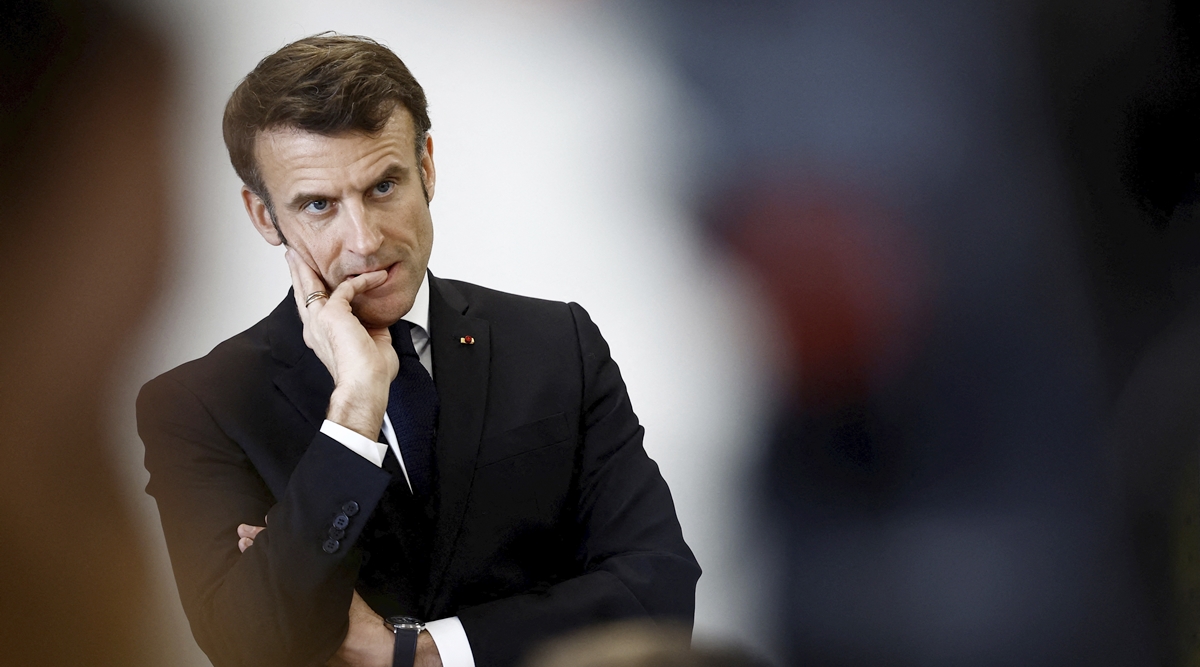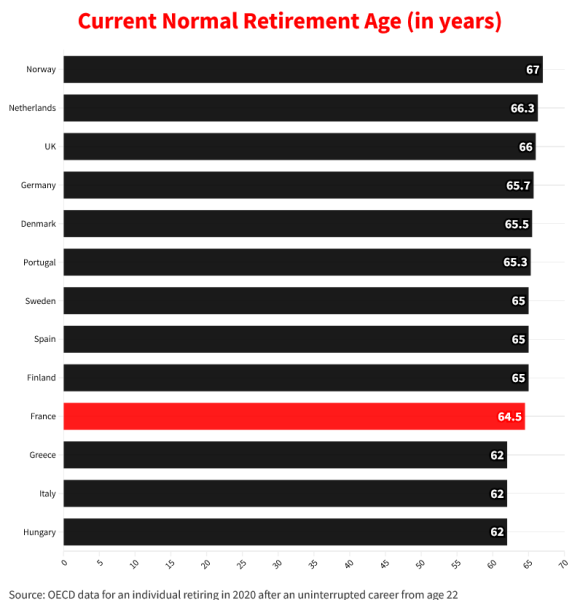Stay updated with the latest - Click here to follow us on Instagram
Why French citizens are up in arms against Macron’s retirement age push
Emmanuel Macron's government is pushing an unpopular pension reforms bill through parliament amid widespread protests. Why is this a contentious issue and how could it impact France's future?
 French President Emmanuel Macron seen during an event in southwestern France. (AP, file)
French President Emmanuel Macron seen during an event in southwestern France. (AP, file) Protests broke out in various parts of France Friday after Emmanuel Macron’s government passed the controversial pension reforms bill without debate.
Thousands gathered at the Place de la Concorde public square opposite the National Assembly building in Paris, setting a fire and destroying shop fronts on Thursday night, as per reports in the French media. Trash bins overflowed in the capital city as garbage collectors went on strike. Police said that over 200 people were arrested in Paris alone, while large crowds of protesters holding slogans that read “Retirement before arthritis” and “Margaret Macron” (comparing him to the controversial British PM Margaret Thatcher) gathered in major cities like Marseille, Lyon, Lille, Nantes and Rennes.
The mass demonstrations gathered strength after Prime Minister Elisabeth Borne announced Thursday that she will trigger Article 49.3, a special constitutional provision that allows passage of bills without a vote, to pass the pension reforms.
Speaking in parliament amid jeers, Borne made a last-ditch attempt to make her case. “We cannot bet on the future of our pensions. This reform is necessary,” she said, but neither the public nor the Opposition seemed convinced.
Far-right leader Marine Le Pen termed it a “democratic coup” while left-wing leader Jean-Luc Mélenchon told Radio France that he “encourages spontaneous mobilisations throughout the country”.
A longstanding problem
Pension reforms have been a touchy subject in France for decades, with the strong labour unions traditionally wary of any attempts at diluting the hard-fought rights. The latest reforms are the most exhaustive among a series of attempts made since 1993 and had been among Macron’s election campaign promises.
Broadly, the law proposes to raise the early retirement age in France from 62 to 64 years by 2027, with workers now having to put in 43 years of service to be eligible to draw the full pension (here’s an explainer on all its provisions). This comes almost a decade after then-President Nicholas Sarkozy raised the retirement age from 60 to 62 in 2010, a move that cost Sarkozy his 2012 re-election.
Even with the latest hike, France’s average retirement age is mild compared to most of its neighbours. According to OECD data, the early retirement age for men and women in France is 55-62 years and the regular retirement age averages 64.5 years, which is slightly higher than the EU average of 64.3 years for men and 63.5 years for women.

But it is still lower compared to other EU states like Germany (65.7 years), Portugal (65.3 years) and Spain (65 years) or Scandinavian countries like Denmark (65.5 years), Finland (65 years) and Sweden (65 years).
Familiar scenes
Macron is no stranger to protests – a year into his presidency, France had witnessed the months-long Yellow Vest movement calling for social and economic justice. Later, in 2019, after Macron first proposed the pension reforms, strikes erupted across France, prompting him to put his plans on hold. A pandemic and another presidential election ensued before he unveiled the law in January 2023.
Critics have warned that the ongoing demonstrations against the reform – and how Macron implemented it – could end up contributing to Marine LePen’s popularity.
The investment banker-turned-President, who was re-elected with a narrow majority in 2022, chose to use Article 49.3 of the French Constitution, which enables the government to avoid a vote but opens it up to a censure motion. France-based Le Monde reported that President Macron chose this route despite warnings from his allies and PM Borne as he believed it was too risky to put it to vote in the lower house of parliament.
 Pallets burn as protesters demonstrate at Concorde square near the National Assembly in Paris, March 16, 2023. (AP/PTI)
Pallets burn as protesters demonstrate at Concorde square near the National Assembly in Paris, March 16, 2023. (AP/PTI)
Invoking Article 49.3, while not rare, is considered undemocratic. In a biography of the French President titled ‘The French Exception,’ author Adam Plowright attributed the use of Article 49.3 to pass one of Macron’s bills (Macron was then the Finance Minister in François Hollande’s government) as a key factor in his decision to launch a new party. “The bill passed through parliament and became law, but the use of the 49.3 mechanisms meant it lacked legitimacy in the eyes of many voters,” Plowright wrote, adding that one of Macron’s old friends said, “The 49.3 was a failure and he [Macron] experienced it as a failure.”
Since coming to power, Macron’s government has used it 11 times, as LePen was quick to point out in her call for Borne’s removal. “The use of [Article] 49.3 for the 11th time and on a text so fundamental and massively rejected by the French, betrays the headlong rush of an executive who no longer hears and no longer listens to the people. No confidence vote must be the answer to this impeded democracy,” she wrote on Twitter.
LePen’s National Rally party has called for a no-confidence vote against the government. Though unlikely to succeed, the motion has the potential to trigger nationwide instability. With Macron being barred from contesting for the president’s post for a third consecutive year and no other key figure in sight, LePen is uniquely positioned to take advantage of the discontent brewing.
Après la gifle que vient d’infliger la Première Ministre aux Français, en imposant une réforme dont ils ne veulent pas, je pense qu’@Elisabeth_Borne doit partir. pic.twitter.com/i1jziZpyON
— Marine Le Pen (@MLP_officiel) March 16, 2023
Laurent Berger, the head of the moderate CFDT union told Reuters as much. “Mrs Le Pen is ready for the ambush,” he said, adding, “The resentment, the social debt that’s building, is going to be exploited by the populists and the far-right. It’s scary.”
- 01
- 02
- 03
- 04
- 05































